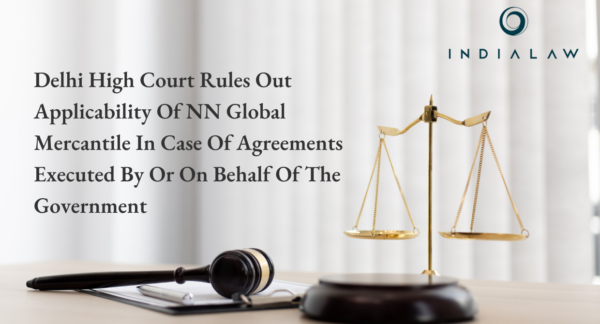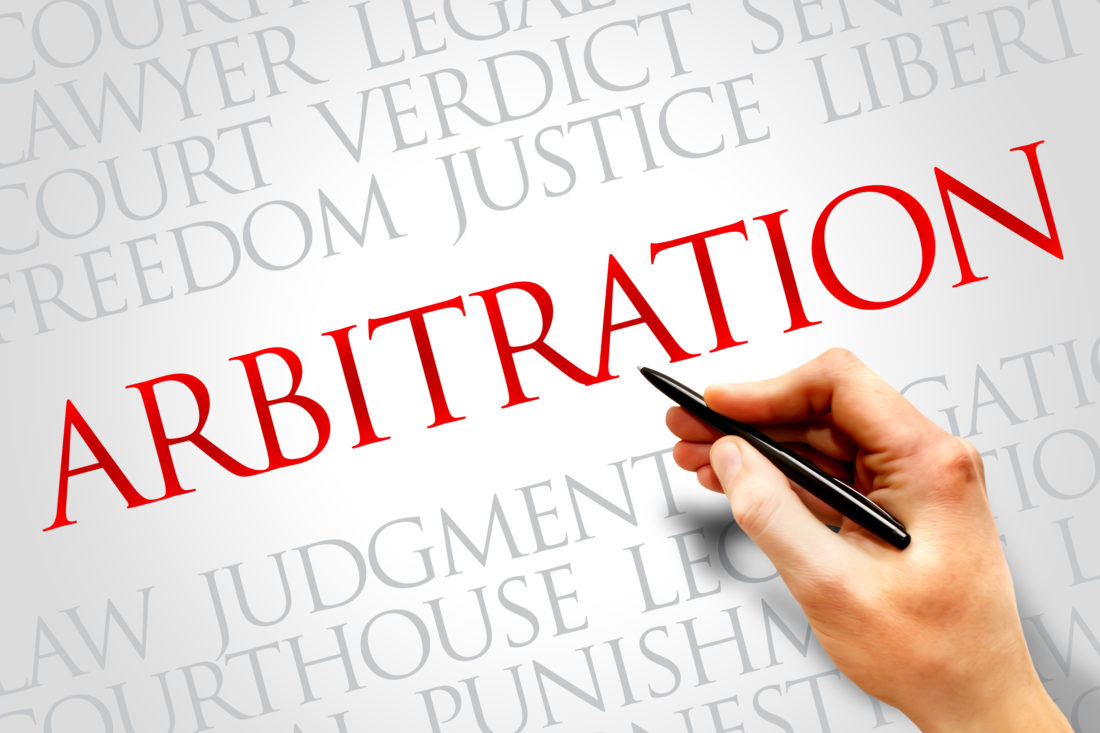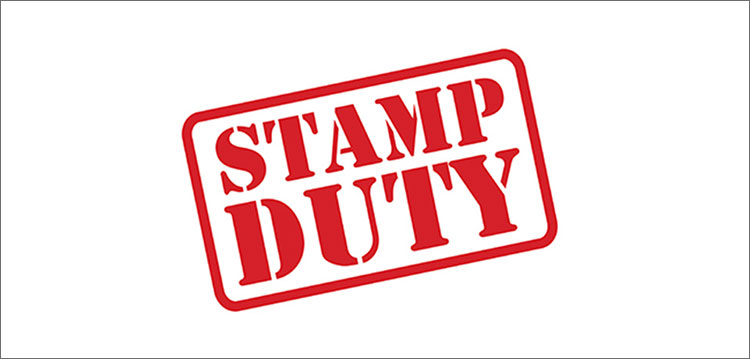If the Document Required to be Stamped is Insufficiently Stamped, then its Copy Cannot be Adduced as Secondary Evidence: Supreme Court
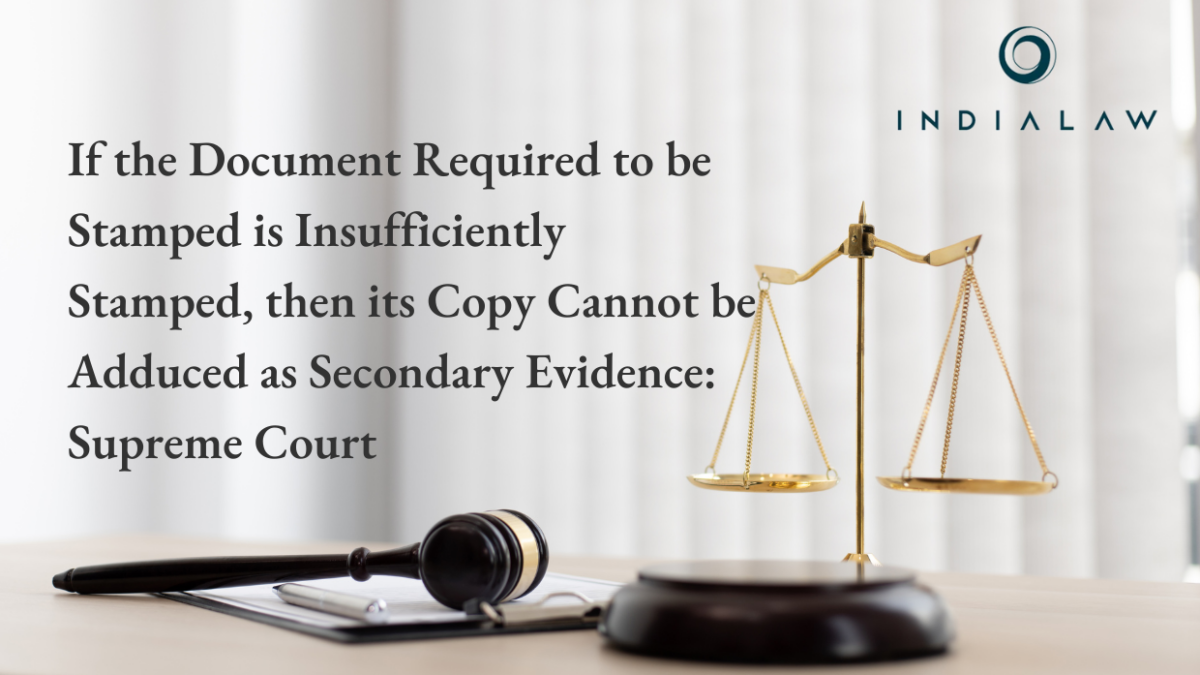
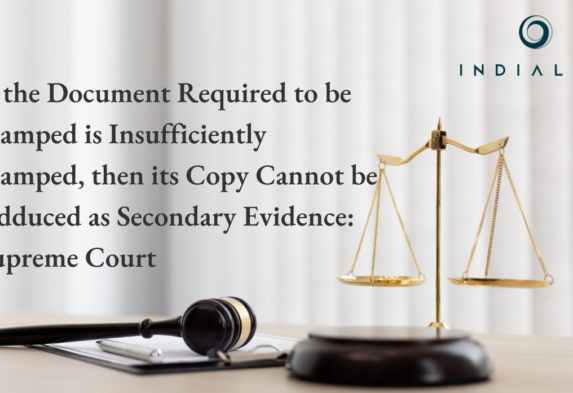
The Hon’ble Supreme Court (“SC”) recently in the case of Vijay v. Union of India[1], held that if a document required to be stamped is not sufficiently stamped, then a copy of such a document cannot be adduced as secondary evidence.
The division bench of the SC comprising of Justices Abhay S. Oka and Sanjay Karol clarified that Section 35 of the India Stamp Act, 1899 (“Stamp Act”) does not apply to a document if it is not chargeable with duty. It stated, “If a document that is required to be stamped is not sufficiently stamped, then the position of law is well settled that a copy of such document as secondary evidence cannot be adduced.”
Brief facts of the case:
In the instant case, Plaintiff (‘Vijay’ i.e. Appellant) and Defendant (‘Mrs. Mrinalini Devi Pour’ i.e. Respondent) entered into an Agreement to Sale on 4th February 1998. The dispute arose between the parties and a suit for specific performance of the contract was filed by the Plaintiff. Further, the Plaintiff also sought permission to file a copy of the Agreement to Sale as secondary evidence. The trial court permitted filing a copy of the agreement under Section 65 of the Evidence Act as secondary evidence.
Aggrieved by the Order, the Defendant filed a Review against the said Order and the district Court turned down the Order of the trial Court and stated that a copy of the Agreement to Sale as secondary evidence would not be permissible as the Agreement was not duly stamped. The same is barred according to Section 35 of the Stamp Act. The impugned Order was challenged before the High Court (“HC”) and the same was upheld by the HC. The Plaintiff then filed an Appeal before the Hon’ble Supreme Court.
Contentions of the Appellant/ Org.Plaintiff
The Appellant contended that Section 35 of the Stamp Act would not be applicable due to the absence of a stamp duty requirement at the time of the Agreement’s execution under the Indian Stamp (Madhya Pradesh Amendment) Act, 1989 (“MP Act”). It was further averred that under Section 65 of the Evidence Act, filing a copy of the Agreement to Sale as secondary evidence would be permitted.
Contentions of the Respondent/Org.Defendant
The original document not being duly stamped has no admissibility in law and hence the copy of the said document cannot be admitted as secondary evidence. The Stamp Act Section 35 stipulates that insufficiently stamped documents are not admissible in law.
Issues before the Hon’ble Supreme Court
The following were the two main issues that were considered by the SC while passing the Judgement:
- Whether the bar of admissibility created under Section 35 of the Stamp Act will be applicable to the agreement(s) to sell executed on a prior date to the enactment of the Indian Stamp (Madhya Pradesh Amendment) Act, 1989?
- Can a copy of a document be adduced as secondary evidence when the original document is not in the possession of the party?
Findings of the Hon’ble Supreme Court
Issue A
The Hon’ble SC stressed the point that the object of the Stamp Act is to collect proper stamp duty on any document on which such stamp duty is payable. Section 35 of the Stamp Act applies to instruments that are not duly stamped and such instruments/ documents cannot be accepted as evidence.
The bench further explained that to impose Section 35, the following conditions must be satisfied:
- The document be chargeable with duty; and
- It is not duly stamped.
While considering the instant case, the Hon’ble SC noted that the document was not chargeable with duty, there is no mandate that it should be duly stamped to be admitted as evidence. The bar provided under Section 35 of the Stamp Act shall not apply in this case.
The SC further clarified that according to law, a document that should be duly stamped and the same is not sufficiently stamped, then a copy of such a document cannot be admissible as secondary evidence. However, in this case, this would not apply as the document in question at the time of execution was not liable to be stamped.
Issue B
The difference between primary and secondary evidence under the Evidence Act was examined by the SC.
It noted that the primary evidence under the Evidence Act should be presented first, and the secondary evidence can be admitted only in the absence of primary evidence. When the non-availability of the original document is explained properly, then secondary evidence can be allowed.
In this context, the bench noted that “Law requires the best evidence to be given first, that is, primary evidence. Section 63 of the Evidence Act provides a list of the kinds of documents that can be produced as secondary evidence, which is admissible only in the absence of primary evidence.”
The SC explained that “When the non-availability of a document is sufficiently and properly explained, then the secondary evidence can be allowed. Secondary evidence could be given when the party cannot produce the original document for any reason not arising from his default or neglect. When the copies are produced in the absence of the original document, they become good secondary evidence. Still, there must be foundational evidence that the alleged copy is a true copy of the original.”
While analyzing the second issue, the scope of Section 65(a) of the Evidence Act was examined by the SC which deals with secondary evidence. The Court elaborated the following:
- That secondary evidence can be presented to the Court as an alternate when the original document is not in possession of the party, or it is in possession of the third party;
- The party having the original document refuses to produce the same even after due notice; and
- It must be ensured that the alleged copy is a true copy of the original.
Decision of the Hon’ble SC
In this case, the exact status of the original document cannot be ascertained and hence it cannot be procured. In such a scenario secondary evidence could be allowed if other requisites are duly compiled with.
The Hon’ble SC bench concluded that “..We are of the opinion that in the instant case, the Plaintiff’s prayer for leading the secondary evidence ought to be allowed in so far as the documents sought to be introduced as secondary evidence be taken by the concerned Court and exhibited, with its admissibility being decided independently, in accordance with law under the Evidence Act”.
Conclusion
The Hon’ble SC answered Issue A negatively, wherein it clarified that the documents in question need not be stamped at the relevant period to attract the bar provisioned under Section 35 of the Stamp Act.
Issue B was answered affirmatively, wherein the SC said that the copy of a document can be adduced as secondary evidence if other legal requirements are duly complied with.
The Hon’ble SC allowed the admission of the document as secondary evidence and directed that the document sought to be filed should be taken on record by the Court, and the admissibility of the same should be decided independently according to the Evidence Act.
[1] Civil Appeal No. 4910 of 2023, reported in 2023 LiveLaw (SC) 1022

